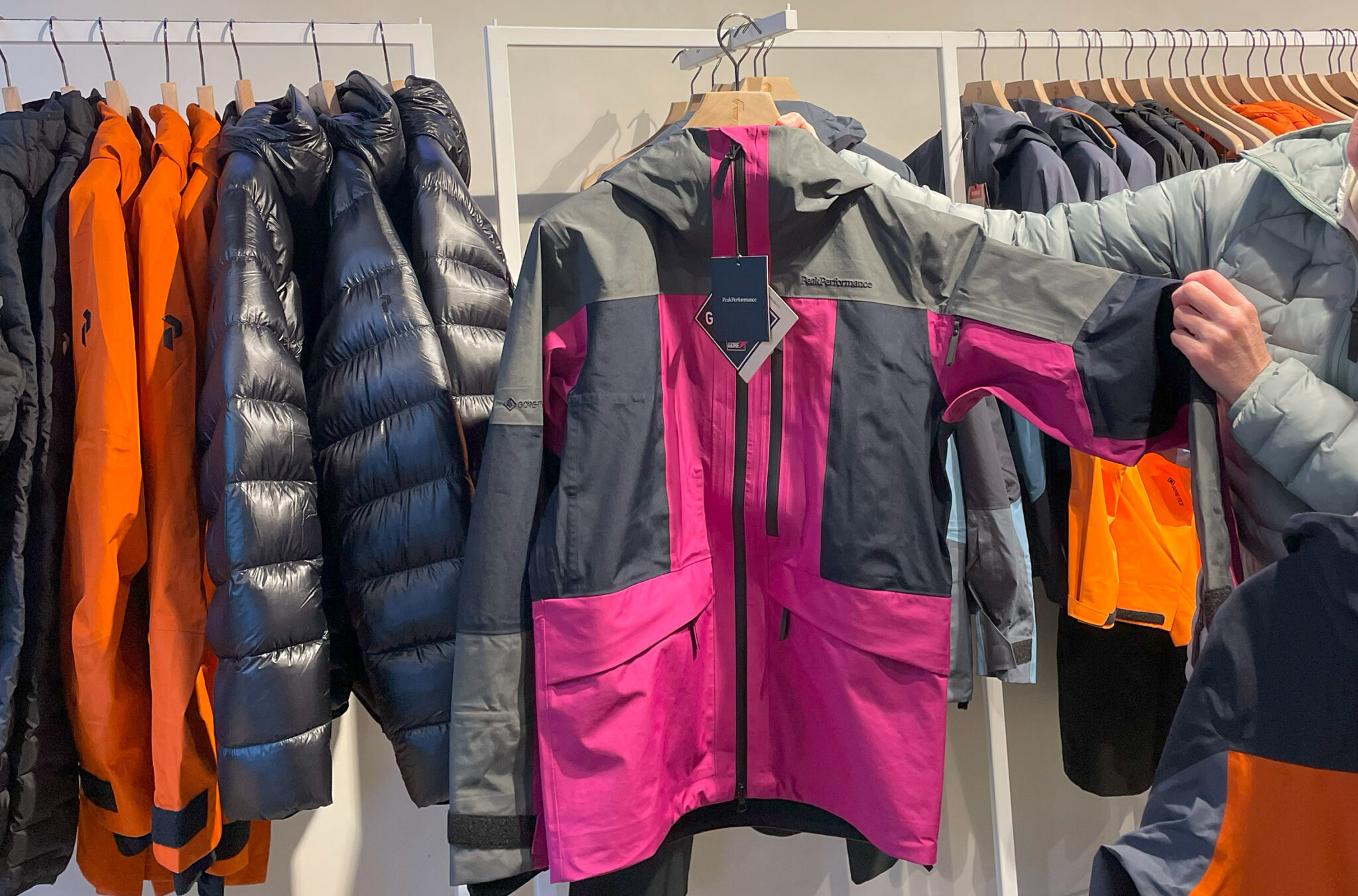I recently learned that roughly three-quarters of the modern wardrobe is made out of plastic. After hearing this I rushed to sift through my shirts, fleeces, gym clothes and jacket labels to find my wardrobe was no exception. In fact, three-quarters would be an understatement, because I have a lot of ski gear.
On the mountain, we tend to wrap ourselves in plastic, and as an outdoor gear enthusiast, I can’t help but feel guilty and conflicted by the constant churn of outdoor fashion trends which promote this plastic onslaught. So I delved into the relatively new world of sustainable outdoor gear.
View this post on Instagram
Fashioning Change
The weight of responsibility for the fashion industry’s environmental impact is becoming increasingly undeniable, with its status as one of the highest polluting industries a stark reality. Thankfully, instead of resignation, we’re witnessing a global effort to change the way we make, use, recycle, and reuse clothing and gear. It’s more than just a trend – it’s a necessary shift in the very fabric of an industry I love dearly.
Hoping to learn more about the industry and its current state of affairs, I spoke with Sea-to-Sky local Dayna Rachkowski, a second-year MA student and researcher at UBC’s Institute of Resources, Environment, and Sustainability. I asked Dayna how consumer attitudes toward sustainability in the outdoor industry are evolving and how this is influencing the strategies of major outdoor brands.
“As outdoor enthusiasts shift towards minimizing their environmental impact, gear choices become crucial,” says Danya. “Consumers will continue to vote with their dollar by choosing outdoor brands that focus on production with positive impacts while creating lasting, repairable gear. This growing demand, coupled with regulatory action, incentivizes outdoor companies to innovate.
Brands like Patagonia, Arc’teryx and Peak Performance are making the most out of repair programs and consignment gear, which, in turn, increases customer loyalty and engagement. Peak Performance goes beyond, engaging communities through sustainability events like their recent Peak Performance Kitsilano Upcycling workshop – the first of its kind and hopefully another great example of what’s to come for the industry.”
In addition, I asked Dayna for some tips, as a consumer, to make better decisions when selecting new gear.
5 Tips for Selecting Sustainable Outdoor Gear
- Embrace pre-loved: Seek certified reused sites like Arc’Teryx’s ReGEAR. Check out local consignment shops (Whistler’s Re-Use-It Center), vintage stores (F as in Frank Whistler and Vula Vintage) or online marketplaces for gently used gems. It’s budget-friendly and reduces waste.
- Invest in quality: Durable gear lasts longer, saving you money and resources in the long run.
- Seek recycled materials: Look for jackets, pants, and accessories made from recycled polyester or nylon, recycled wool, or plastic water bottles like Gogglesoc’s rPET® or Ororo’s Repreve® Collection.
- Support certified brands: Opt for bluesign® or OEKO-TEX® certified. Seek companies with B Corp certification, PFAS-free (without forever chemicals).
- Repair over replace: Extend the life of your gear with simple repairs or professional reproofing.
10 Outdoor Brands Leading the Sustainable Outdoor Gear Movement
Companies are actively seeking new opportunities, partnerships, and circular solutions for a more responsible future. The outdoor industry, in particular, has seen dramatic advancements proving that eco-conscious choices don’t have to compromise on performance, style, or affordability.
Peak Performance
Peak Performance champions a holistic approach to sustainability, focusing on responsible material sourcing, reducing their environmental footprint throughout the supply chain, and extending product lifespans. Their commitment is evident in their detailed sustainability reports and their dedication to designing durable, long-lasting gear.
Peak Performance’s Care & Repair program goes above and beyond, offering complimentary repair services in-store, such as zipper slider replacements and down jacket patching. Adding to their commitment, Peak Performance utilizes leftover fabric scraps to repair small tears, minimizing resource waste and showcasing their dedication to sustainability. Check out their recent Helium Utility Flo collection, which utilizes surplus fabrics to create the outerwear piece (expect the next Helium Utility Flo capsule in 2025).
View this post on Instagram
Gogglesoc
This handy lens protector not only offers a minimalistic and sleek design solution to the traditional goggle case but recently surprised me with an even cooler feature – sustainability. My latest Gogglesoc, a collaboration with SMITH’s new MAG goggle line, sparked a deeper dive into the Whistler-based brand’s story. Here I discovered the magic ingredient – rPET, recycled plastic water bottles.
This revelation transformed my perception of my seemingly simple Gogglesoc into a symbol of responsible ownership and circular solutions. Since its inception in 2016, Gogglesoc has proudly diverted over 1 million plastic bottles into an amazing line of mountain-ready accessories.
You can find GoggleSoc at multiple Whistler retailers including Comor.
SMITH
Launching its sustainability program in late 2022, SMITH has made significant strides in reducing their environmental footprint across all outdoor product lines. SMITH’s journey began with the elimination of plastic waste from their winter packaging, including goggles and helmets, marking a pivotal moment in their commitment to sustainability.
Collaborating with Gogglesoc is just one aspect of SMITH’s broader efforts. By teaming up with Polartec, they’ve embraced sustainable fabric solutions, while their sunglass frames now incorporate 53% bio-based material, a theme that extends throughout their snow product line.
You can find SMITH products at multiple Whistler retailers including McCoo’s.
View this post on Instagram
Arc’teryx
Arc’teryx offers some of the highest-quality performance apparel on the market. Their efforts surpass performance with their ReBird program, a 5-year-old initiative aimed at extending the life cycle of outdoor gear and promoting a circular economy.
A subsection of the program, ReGEAR, facilitates trade-in programs giving a second life to used Arc’teryx items. ReCARE empowers users to extend product life by up to 45% with care tips and repairs, and their ReCUT program upcycles scraps and used gear into limited-edition pieces. By prioritizing recycled materials and responsible practices, Arc’teryx aims to minimize waste and inspire a more sustainable outdoor apparel industry.
Rossignol
Rossignol is swiftly closing the gap on their lofty sustainability goals, evidenced by groundbreaking initiatives like the ESSENTIAL project and its namesake ski. The ESSENTIAL ski isn’t just about using more recycled materials, it’s designed for maximum recyclability at the end of its lifespan.
The result? A 77% recyclable ski constructed with bio-sourced materials and a detachable binding system that facilitates easier material separation for recycling. This innovative approach sets a new standard for responsible product development within the winter sports industry.
You can find Rossignol products at multiple Whistler retailers including Can-Ski Village and Coastal Culture Sports.
View this post on Instagram
Jones
Jones Snowboards carves a path less travelled through their pioneering efforts. Their 2024 snowboards and splitboards became the first hard goods to achieve Fair Trade Certification, ensuring ethical treatment and fair wages for factory workers.
This aligns with their longstanding commitment to sustainability, evident in their solar-powered operations, use of recycled materials, and Re-Up Tech program that upcycles old snowboards into top-of-the-line new products.
You can find Jones products at Showcase Snowboards.
View this post on Instagram
Patagonia
A true industry leader, Patagonia is renowned for its unwavering commitment to environmental and social responsibility, effectively paving the way for the greater outdoor fashion industry. Patagonia prioritizes reducing reliance on virgin materials by utilizing recycled content throughout their product lines, and by doing so have removed 20,000 tons of carbon emissions each year from their operations.
Their innovative Worn Wear program promotes a circular economy by encouraging the buying, repairing, and reselling of used Patagonia gear. The California-based company has proven that decoupling emissions from growth can be a big but necessary challenge for modern companies, and their success clearly demonstrates that sustainability can be both good for the planet and good for business, too.
SunGod
Sungod is truly using business as a force for good. As a certified B Corporation, Sungod upholds the highest standard of social and environmental performance as it produces some of the finest and least impactful goggles and sunglasses on the market.
Sungod boasts a carbon-neutral status across all products and operations, believing all organizations should be measuring their carbon footprint, reducing it proportionally year-on-year while compensating for it at the same time.
View this post on Instagram
Smartwool
Smartwool produces some of the finest performance layers in the outdoor fashion industry, however, their commitment goes far beyond function – Smartwool is also a leader in sustainable sourcing and innovative recycling practices. Through strategic partnerships, Smartwool ensures the highest quality merino wool while minimizing environmental impact.
As of 2023, nearly half of Smartwool’s wool comes from ZQRX-certified farms. Smartwool’s Second Cut program tackles another sustainability challenge – textile waste. Recognizing socks as a frequently discarded item, they partnered with Material Return to create a unique upcycling solution. Over 1 million socks have been collected and reworked into high-performance products in Smartwool’s Second Cut program.
View this post on Instagram
Bern
Bern offers the coolest and most unique selection of all-season helmets, and they’ve recently introduced impressive green initiatives into their business, too. Bern partners with e-commerce software provider EcoCart, granting the customer transparency into each product’s environmental footprint giving the option to offset, or neutralize the impact of each online order.
Furthermore, the majority of Bern’s unique designs can be used year-round, allowing the customer the opportunity to cut back on consumption. Finally, when your helmet has reached the end of its lifecycle, Bern’s helmet recycling guide will support you with your disposal needs.
You can find Bern products at evo Village Sports.
View this post on Instagram
Buying sustainable outdoor gear might take a touch more research, but by understanding the sustainability efforts of different brands, we can make informed choices that align with our own values. Every step you take towards sustainable consumption contributes to a healthier planet for everyone.
Choose longevity over trends, embrace pre-loved gear and support brands making genuine efforts towards a more sustainable future, and together, we can ensure the outdoors remains a healthy place for exploration and enjoyment for generations to come.
If you’re here in April, look at AWARE’s Earth Week events, which include a clothing swap and repair cafe. Visit the Whistler.com calendar for more sustainable events happening throughout the year. We’re also checking in with Whistler-based businesses putting sustainability at the forefront of their operations in a video series called Whistler Changemakers which you can find on our sustainability page.
Save up to 20% on lodging with Whistler.com this summer. Stay & Golf from $289 CAD per person, per night or Stay & Bike from $179 CAD per person, per night. Sign up to be a Rewards Member (for BC and WA residents only) and receive a FREE $50 CAD activity voucher on stays of 3+ nights.
You can also win a summer trip to Whistler with the Escape the Ordinary contest!


